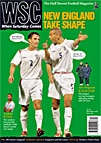 Famous people attract the attention of all sorts of undesirables and footballers are no exception. Taylor Parkes looks at a book that charts the game's underworld connections
Famous people attract the attention of all sorts of undesirables and footballers are no exception. Taylor Parkes looks at a book that charts the game's underworld connections
People have been fascinated by gangsters for as long as gangsters have existed; there are few better illustrations of people’s reluctance to grow up. Organised crime can be an interesting subject and Graham Johnson’s lightweight, quickly written book holds the attention very well. The problem is the popular fascination for gangsters, the image of the underworld boss as sexy, charismatic rebel – rather than the ultimate Thatcherite, responding to poverty and communal desperation by making things worse for everyone but himself. It’s a kind of perverted romanticism that appeals to those whose closest contact with gang culture has been the films of Guy Ritchie or the lyrics of Biggie Smalls, and it’s no surprise that so many footballers, raised to worship guile and machismo but rarely skilled in decision-making, go for gangsters a big way.
While the underworld is encroaching into club ownership in the UK, it’s not accurate to suggest that it “controls” football (not here, not yet) as Football and Gangsters’ subtitle states. Still, links between gangsters and the game are well established – it’s no secret that many of today’s criminal gangs are yesterday’s hooligan crews, or that there have been hoodlums in the players’ lounge since Mad Frankie Fraser got his first pair of pliers.
Footballers are unusually vulnerable to organised crime: their cash makes them an attractive target, their lifestyle brings them into contact with the hardest, nastiest men in town and their cockiness and lack of common sense often seal the deal. Some grew up around budding gangsters and find it hard to slip the shackles of their past; many court underworld pals for the supposed street chic, or a spurious idea of “security” (Sean Davis was doing fine until his self-appointed minder started taxing him for thousands of pounds, threatening his wife and child when he demurred). Others will simply choose the wrong agent or business partner, in blissful ignorance. Once the connections are made, it often requires the intervention of other gangsters, more sympathetic to the player in question, to get them off the hook (perhaps literally). If you can stomach the tabloid style, Football and Gangsters will tell you more than you thought you wanted to know.
It won’t come as a shock that Rio Ferdinand or Robbie Fowler have found themselves keeping bad company (in Fowler’s case, receiving a nasty beating as a consequence), but some of the other names here might raise an eyebrow. Michael Owen’s famous hand-rubbing goal celebration was in fact a “secret message” to one Tom Foley, a local druglord who had been gaining prestige by befriending Liverpool players (who apparently had no idea what he did for a living). Owen – no more likely to get knowingly involved in gangsterism than Jimmy Hill – later received a crash course in the reality of the underworld, when loveable rogues started threatening his life and attempted to kidnap his pregnant sister by bundling her into a car at gunpoint.
Many stories here have been in the tabloids (the author works for the Sunday Mirror) and some are less than shocking: are we supposed to be surprised that Steven Gerrard’s proposed move to Chelsea prompted internet death threats? Much of the book is really about the perils of working as a tabloid muckraker, as Johnson hides out in hotels and faces down threats from various ne’er-do-wells, but there’s no denying the basic point – that footballers have an inexhaustible capacity for mixing with the wrong crowd. The richer they are and the more bullet-proof they feel, the greater the chances they’ll end up as prey.
If most of the book is depressing, the chapter on events surrounding Leeds during their financial crisis is simply bizarre. Johnson’s sources claim that there were plans hatched to spike Michael Duberry’s food with drugs, hire hitmen to break Gary Kelly’s legs, and – most amusingly – fix a match by slipping ecstasy to opponents Coventry and their manager, Peter Reid. It’s impossible to read the protestations of innocence from the accused party without laughing out loud: “It’s ridiculous. What would have been the benefit of Peter Reid being on ecstasy?” Most readers will be able to think of at least two or three benefits, though whether they would have been of any use to Leeds is highly debatable.
From WSC 238 December 2006. What was happening this month